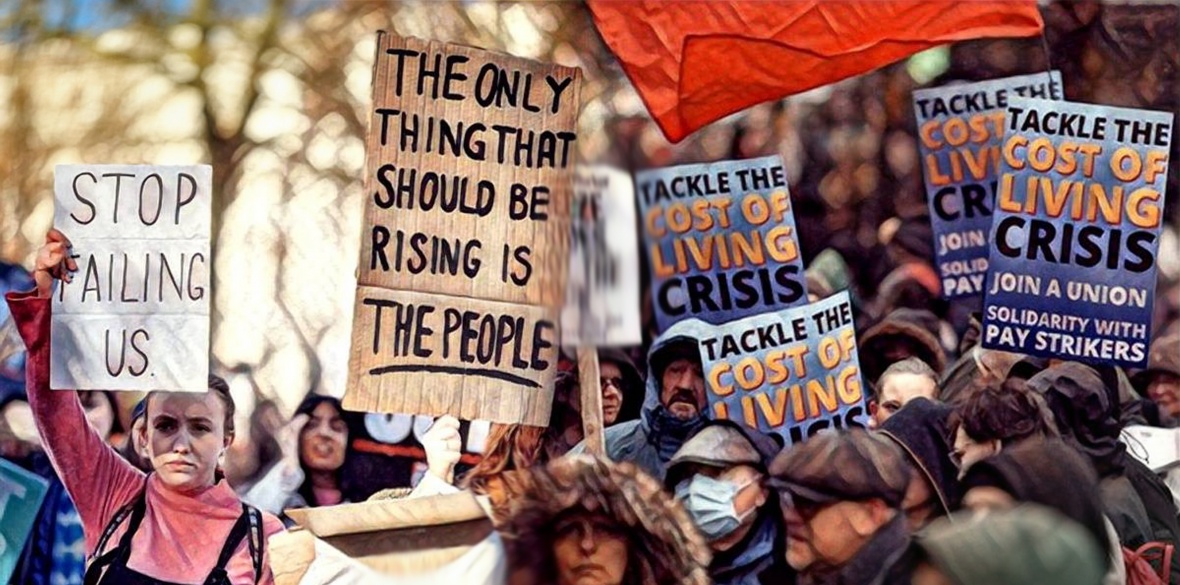This is the last article you can read this month
You can read more article this month
You can read more articles this month
Sorry your limit is up for this month
Reset on:
Please help support the Morning Star by subscribing here
BRITAIN is not at war with Russia or anyone else — although there is a war with dreadful impacts going on in Ukraine.
Boris Johnson’s war is performative, playing to a crowd of right-wing Tory MPs and newspapers and which unfortunately Labour also has a supporting role in.
However, there is a war going on in this country and it is the Tories’ class war against ordinary people.
Covid has been left to run unchecked, the NHS starved of the resources it needs, energy prices and general inflation rising well above wages and little or nothing done to address the climate emergency.
Although every crisis has its specifics, capitalism is a system based on crisis, on boom and slump, and the cost of living has been a significant issue for the left and working people since the development of industrial capitalism in the late 18th century.
Two of the most well-known refrains of the first half of the 19th century were for the repeal of the corn laws, which had the effect of making bread more expensive, and the traditional song the Roast Beef of Old England, sung to reflect the view that roast beef was the right of the “freeborn Englishman” but in reality few could afford to eat it.
Calls to scrap the corn laws were part of Peterloo in 1819, underlining that in the popular mind, calls for political democracy were allied to demands for a decent standard of living.
The laws were eventually repealed in the 1840s after a campaign by led by the Anti Corn Law League, run by bourgeois liberals.
As Marx noted, the reality of the repeal was that industrialists would reduce wages — as bread cost less — and make more profits.
Hence a successful struggle on the political front also had to be waged industrially in the workplace, with the development of organised labour into unions to push for better pay and shorter hours.
In 2022 many might question how sensible and ethical it is to make having roast beef as a key demand for maintaining living standards is. But there are now practical alternatives to eat.
In the 1830s and 1840s only better-paid workers — when they were better paid which was often seasonal — could afford to regularly eat meat of any kind.
Urban workers’ core diet often consisted of bread, poor-quality cheese and beer (of a low strength to replace water). Rural workers might more usually subsist on potatoes.
Poor diet was only one element of the cost-of-living crisis, at it is now. There was an impact on health and this was often magnified by bad housing conditions. All this meant that the average age of death for workers was very low by modern standards.
This is a 2022 issue as well. Professor of public health at UCL Michael Marmott has warned that government policies are increasing inequality and seeing a decline in the health of the poorest in society.
What strategies are there to grapple with this? CWU general secretary Dave Ward has argued that a general strike might be needed. This was tried by the Chartists in 1842 but, while effective, did not bring change.
Another strategy was pursued as a result, what the historian EP Thompson described as “warrening” capitalism from end to end with defensive structures such as trade unions, trades councils, co-ops and so on.
These have worked in the 150 years since they started to develop, with the TUC being formed in 1868, but they are at best imperfect.
Historically in the fight to for a decent standard of living and health, nothing was or should be off the agenda.
Keith Flett is a socialist historian.










